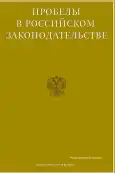Предпосылки и тенденции современного терроризма в условиях глобализации
- Авторы: Кучмезов Р.А.1
-
Учреждения:
- Северо-Кавказский институт повышения квалификации (филиал) Краснодарского университета МВД России
- Выпуск: Том 15, № 4 (2022)
- Страницы: 164-168
- Раздел: Статьи
- URL: https://journal-vniispk.ru/2072-3164/article/view/147548
- ID: 147548
Цитировать
Аннотация
Ключевые слова
Полный текст
Открыть статью на сайте журналаОб авторах
Расул Абдулмуталифович Кучмезов
Северо-Кавказский институт повышения квалификации (филиал) Краснодарского университета МВД России
Email: 89286910015@mail.ru
майор полиции, канд. пед. наук, старший преподаватель кафедры организации правоохранительной деятельности Нальчик, КБР, Россия
Список литературы
- Ахтамьянов Р.Р. Миграция как детерминанта экстремизма // Право: ретроспектива и перспектива. 2021. № 4 (8). С. 58-61.
- Берснакаева Т.М. Процесс глобализации: негативный и положительный аспекты // В сборнике: Роль и место информационных технологий в современной науке. Сборник статей Международной научно-практической конференции. 2017. С. 115-117.
- Клементьев А.С., Хлопкова О.В. Миграция как фактор роста террористических угроз на территории российской федерации и за рубежом // Противодействие терроризму. Проблемы XXI века - COUNTER-TERRORISM. 2017.№ 2. С. 16-20.
- Левашова О.В. Современные проблемы терроризма // В сборнике: Современная экономика России: достижения, актуальные проблемы и перспективы развития. Сборник материалов Всероссийской научной конференции, посвященной памяти профессора Н.Г. Нечаева. 2019. С. 300-302.
- Малиновская Т.И. Глобализация как причина нарастания рисков в обществе // Вестник Гродненского государственного университета имени Янки Купалы. Серия 1. История и археология. Философия. Политология. 2014. № 1(166). С. 103-107.
- Никульцева А.Н. Миграционный кризис и международный терроризм // В сборнике: Деструктивное влияние террора на политическую систему и правовую среду Российского государства. Материалы Всероссийской научно-практической конференции. Под редакцией О.И. Чердакова. 2017. С. 305-310.
- Омарова Л.Б. Природа конфликтов в глобальном мире // Гуманитарные науки. Вестник Финансового университета. 2016. Т. 6. № 2 (22). С. 76-80.
- Паламаренко Е.В. Вызовы современного мира: неконтролируемая миграция и международный терроризм // В сборнике: Синтез современных наук. Сборник материалов IV международной научно-практической конференции. 2016. С. 109-112.
- Потемкина О.Ю. Терроризм, нелегальная миграция, защита прав граждан - приоритеты сотрудничества в сфере внутренних дел и правосудия // Европейский Союз: факты и комментарии. 2019. № 95. С. 44-48.
- Черкесов А.Ю. Глобализационные факторы, благоприятствующие распространению информационного экстремизма и терроризма: проблемы и пути противодействия // Образование и право. 2021. № 6. С. 367-371.
Дополнительные файлы








